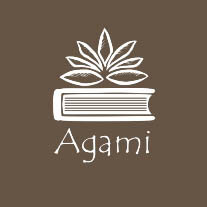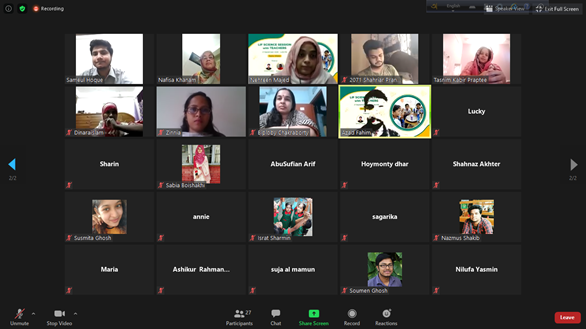Teaching Science
On September 21, 2020 the Life is Fun (LiF) team organized an online training session for science teachers. The objective of the workshop was to facilitate teachers with different teaching methods and approaches, gain knowledge and skills for giving different interventions and motivation to the students to build their curiosity for science, generate ideas for low cost teaching aid development and create effective students’ engagement. The session was presented by LiF interns Baktiar Alam Bulbul and Sameul Hoque Fahad. The topic discussed on the workshop was about water cycle, water pollution, safe and unsafe water & importance of water where they talked about how teachers can provide these lessons easily and effectively to the students.
The session began at 04:00 pm. The session was joined by Executive Director of Agami Education Foundation Nafisa Khanam, Program Director Nehreen Majed, LiF Program Manager Zinnia Afrin, LiF program Coordinators Azad Fahim and Ayesha Mahmood, Lif Interns Shahriar Pranto, Sushmita Ghosh, Sabia Boishakhi and Teachers Nilufa Yesmin, Sabrina Alam Liza, Biplobi Chakrabarty from Peyarabag School, Lucky Akter, Shirin Akhter from Nandipara School, Dinara Islam Lucky and Sagorika Das from Sohag Swapnodhara School, Nazmus Sakib from Fames, Mizanur rahman from Alok school, Tasnim Kabir from BMS and Soumen Ghosh from Shapnagar Bidyaniketon.
The session was started by Nafisa Khanam Executive Director of Agami Education Foundation who spoke about science education and LiF. Then Program Director Nehreen Majed shared her valuable speech about LiF and their work. Then Azad Fahim, Coordinator of LiF spoke about Agami Education Foundation, LiF, Goal of LiF and objectives of the workshop. Then presenter Baktiar Alam Bulbul discussed about water cycle and water pollution. He said that the topic water cycle and water pollution can be taught to students by asking some inquiry-based questions like, “How does water get into the oceans?”, “How does the rain form?” at the start of the lesson which will help the students to think about the topic. He also discussed about experiments consisting of low-cost teaching aids that can become handy for teachers to teach about the water cycle and water pollution such as creating an artificial water cycle in the classroom.
In the meantime, teachers from different schools also shared their valuable experience and teaching methods with everybody which made the session more interactive. Then Sameul Hoque Fahad another presenter of the session discussed about safe and unsafe water & importance of water. He discussed about how teachers can teach safe and unsafe water to students by asking them some inquiry-based questions for example, “As you saw polluted water and its implications in your previous experiment can you tell us what is safe water?” which helps students to learn by linking their knowledge of water pollution. Then he also discussed about importance of water where he discussed how some thought-provoking questions like “How long can they survive without food?” and “How long can they survive without water?” which will trigger students’ thoughts to realize the importance of water in their everyday life. He also discussed about low cost teaching aid experiment using only a plastic bag or cup which will help students to understand the importance of water quite easily, concluding the presentation part.
After conclusion other interns and coordinator of the LiF program introduced themselves who are working tirelessly to resuscitate science among the underprivileged students through fun, play and simple hand on activities. Then there was an open discussion with the teachers where teachers shared their experience about the workshop and different experiences from their classes. They also gave their suggestions on how LiF can further facilitate them in the future. Then the program concluded by speeches from Program Director Nehreen Majed and Zinnia Afrin Program Manager of LiF.

